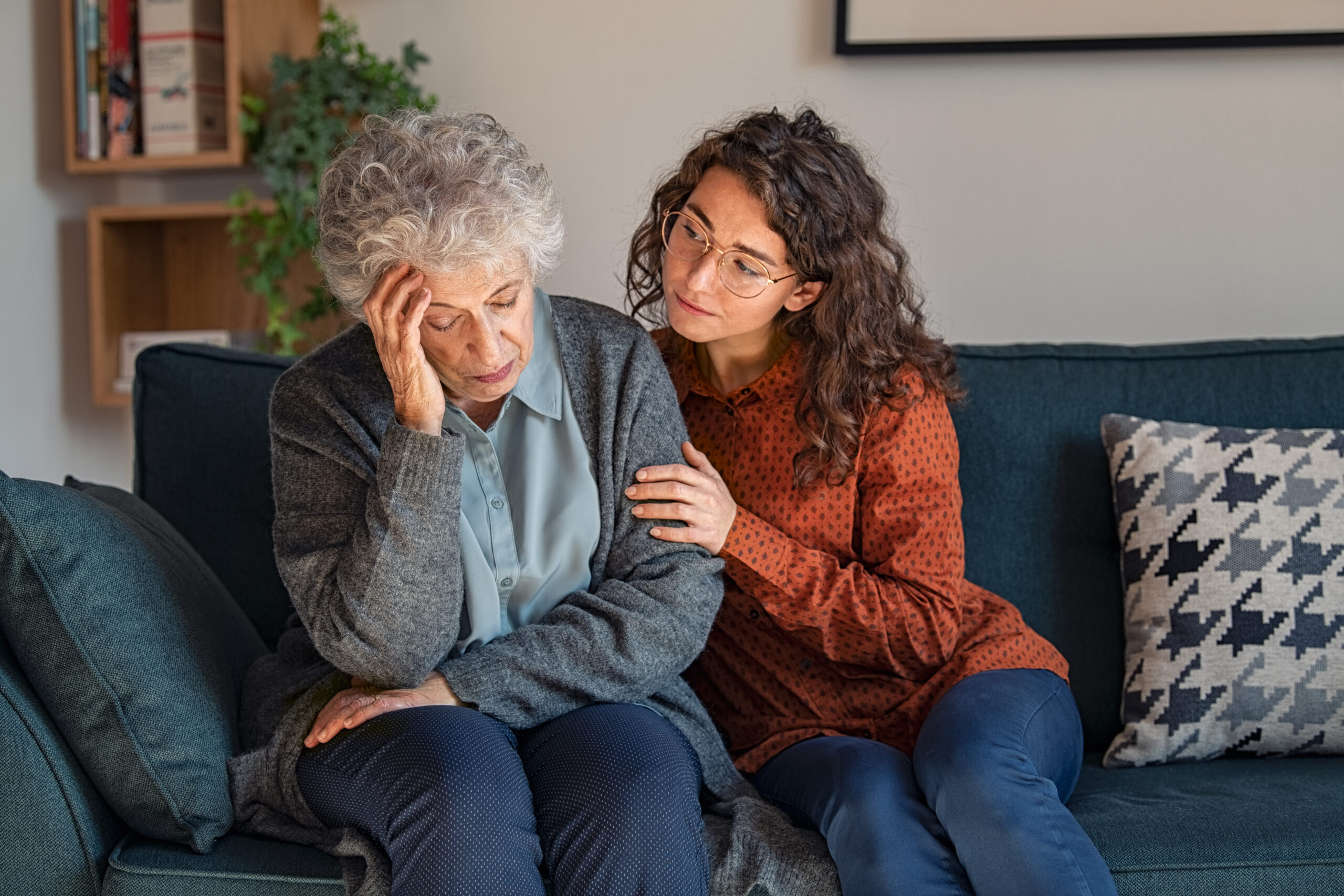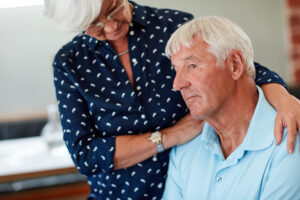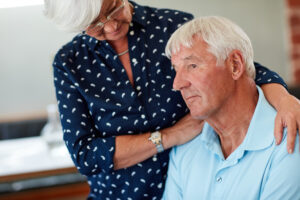Find Assisted Living in Your Area
Although many Americans provide care for their elderly relatives, caring for a loved one with dementia presents unique challenges and considerations. Watching a loved one’s personality change is often difficult, and people with dementia frequently display inappropriate behaviors.
Caregiving needs tend to increase as the disease progresses, with seniors able to manage fewer everyday tasks independently. Seniors often lose control of their bodily functions, while additional difficulties may include sundowning, wandering and emotional instability. Seniors with dementia often need greater supervision; the feeling of always needing to be alert can be a major source of frustration and stress for caregivers.
This guide helps caregivers understand sundowning, including the signs of sundown syndrome, common triggers and how to prevent it. It also includes tips and resources for those looking after somebody with dementia.
What Is Sundowning in Dementia?

Sundowning, also known as late-day confusion, is a group of symptoms that typically present in the late afternoon or early evening. Research studies have found the prevalence of sundowning in individuals with dementia ranges from 2.5 to 66%.
Episodes typically last for a couple of hours, although the actual time varies for each person and each occurrence. For some sufferers, symptoms can continue into the night and disturb their sleep.
Although there’s no clear consensus as to what causes sundowning, it’s widely believed to be disease-related brain damage, in particular, damage to the hypothalamus. When the hypothalamus is damaged, it can affect the circadian rhythm, or the body’s natural sleep-wake cycle.
As well as impacting people with dementia, sundowning also presents challenges for caregivers, particularly when relatives are providing care for seniors who are aging in place.
At What Stage of Dementia Does Sundowning Start?
Although sundowning can start at any stage of dementia, it typically begins during the middle stage of disease progression. However, not all people with dementia will experience sundowning.
Is Sundowning Without Dementia Possible?
While sundown syndrome is most commonly associated with people with dementia, it can also affect older adults who have no cognitive issues. Non-dementia causes may include:
- Sleep deprivation
- Medications
- Low blood glucose levels
- Low blood pressure
- Shrinking brain mass
- Mental health problems
What Can Cause Sundowning?
Although triggers vary for each individual, common causes of sundown syndrome may include:
Overstimulation
Being overstimulated throughout the day, for example because of loud noises or being around lots of people, may contribute to sundowning. However, lack of stimulation and boredom can also be to blame. It’s important to find the right balance of activity and daily stimulation for each individual.
Physical Needs
Physical needs, such as unmanaged pain, hunger or thirst, may trigger sundowning. Additionally, nonverbal people with dementia may become frustrated and agitated at not having their needs met, the effects of which may be confused with actual sundowning.
Lighting
Reduced lighting can affect the brain. It can also make it more difficult for those with impaired vision to see properly, which can increase confusion and stress. Additionally, dimmer lighting can cause more shadows, which may easily disorient somebody with cognitive dysfunction, potentially making them more prone to hallucinate, detach from reality or become paranoid.
Sleep Issues
Older people rarely get sufficient sleep for various reasons, including insomnia, medications, pain, waking frequently to use the bathroom and insecurity. For those with dementia, lack of sleep may be a trigger for sundowning. An inability to separate dreams from reality may contribute to nighttime confusion, fear and agitation. Additionally, as Alzheimer’s disease can disrupt the body’s natural cycle, individuals may feel exhausted during the day and take a nap, which can then hinder nighttime sleeping.
Medications
Some medications may trigger an abnormal brain response, which can increase the likelihood of sundowning. Some may increase restlessness and others adversely affect the memory. Drugs wearing off may play a role in the development of sundown syndrome.
Hormones
Hormone levels change throughout the day, depending on factors such as the amount of light, nutrition and sleep patterns. Hormonal fluctuations can be a trigger for sundowning.
What Are the Signs and Symptoms of Sundown Syndrome?

Signs and symptoms of sundowning vary from person to person. They can also change from daily, depending on the trigger. Caregivers should look for patterns of behavioral changes around dusk or increased intensity of behaviors compared with their baseline state. Common signs and symptoms of sundowning include:
- Mood Changes: Individuals may experience a range of negative mood changes when sundowning, including irritability, anxiety, panic, fear, confusion and aggressiveness.
- Emotional Changes: Seniors may become more tearful and depressive when experiencing sundowning.
- Movement: When sundowning, people with dementia may be more susceptible to wandering. Others may pace backward and forward, rock in a chair or engage in a range of repetitive motions. Individuals may become more clingy and follow their caregiver closely, known as shadowing.
- Sounds: Some people shout excessively when sundowning. Others may mutter, moan, make repetitive sounds or otherwise increase their vocalizations. Research suggests that making sounds may be a way for seniors with dementia to try to self-soothe.
- Insomnia: An inability to fall or remain asleep may be a sign of sundowning. Lack of sleep can also worsen sundowning episodes.
- Resistance: While sundowning, individuals may be less likely to follow instructions or do as a caregiver asks them to.
- Hallucinations: Individuals with cognitive issues may experience hallucinations, paranoia or delusions when sundowning.
Are There Ways to Prevent Sundowning?
The following table lists common dos and don’ts for family members looking for ways to prevent and manage sundowning:
| Dos | Don’ts |
| Follow a structured routine each day. | Sleep too much in the daytime. |
| Get plenty of sunlight daily. | Consume caffeine, sugar or other stimulants late in the day. |
| Avoid alcohol. | Eat heavy meals late at night. |
| Get enough quality sleep. | Overload the senses. |
| Get adequate nutrition, ensuring the diet is full of brain-boosting foods. | Over-medicate. |
| Exercise daily, but not so much that it causes hyperstimulation or exhaustion. | Move vision, hearing or mobility aids out of reach. |
| Include enrichment activities each day. | |
| Include soothing sensory stimulation. | |
| Seek medical advice if sundowning becomes persistent. | |
| Keep familiar items, such as family photographs and favorite keepsakes, at hand for reassurance. | |
| Increase light when it starts to go dark outside. Use indoor lights with bright bulbs and light boxes to prevent shadows and dim corners. | |
| Ask a doctor if melatonin supplements should be used. | |
| Learn and use effective and alternative communication strategies to minimize frustration. |
Tips for Caregivers: How To Deal With Sundowning

Ideas for dealing with sundowning include:
- Medicate: Although over-medicating loved ones with dementia is strongly discouraged, certain drugs, herbs or supplements may help lessen anxiety and/or promote deep sleep. Talk to a doctor before trying a new herb or a supplement.
- Learn Triggers: Most caregivers will eventually recognize when their loved one is starting to sundown. From this, they can often identify major triggers. Reducing triggers can make episodes of sundowning quicker or less severe. Sometimes, it can prevent late-day confusion altogether.
- Validate: Arguing or trying to reason with relatives who are sundowning may cause greater distress for both parties. Instead, caregivers can try validating their loved ones, offering reassurance and checking that they have no unmet physical needs, such as being hungry or needing to use the bathroom.
- Distract: Providing pleasant distractions can sometimes minimize the effects of sundowning. Some seniors respond well to soothing music or favorite tunes from their past. Others find particular TV shows calming. Caregivers can try refocusing an individual’s attention on other topics, such as pets, food, books and light activities. Simply taking a short stroll may be enough to halt an episode of sundowning.
- Seek Help: If caregiving becomes too much, relatives shouldn’t be afraid to ask for help or seek respite services. Sometimes, the most appropriate way of keeping the whole family healthy is to consider moving an individual into a secure memory care community.
Resources for Caregivers of Seniors With Dementia
Taking care of seniors with dementia can feel overwhelming. Thankfully, various resources exist to support caregivers through all stages of dementia progression, including:
| Resource | Contact | Information |
| Alzheimer’s Association | (800) 272-3900 | Operating nationwide, the Alzheimer’s Association provides in-depth information about the disease, helping individuals and their loved ones prepare. It staffs a 24-hour information and support line. Local chapters facilitate localized events, including outreach sessions to raise awareness, caregiver education, fundraisers and in-person and online support groups. The organization is also instrumental in research and advocacy at all levels. |
| Alzheimers.gov | (800) 438-4380 | Alzheimers.gov is a federal government initiative. The website is a valuable source of information for anyone affected by dementia. It details research and provides information on how people can volunteer for clinical trials. Advisors at the ADEAR Center can answer diverse questions and provide free, reliable information. |
| National Institute on Aging | (800) 222-2225 | The National Institute on Aging provides vast information on diverse aging-related topics. Future planning information may particularly interest caregivers and people in the early stages of disease progression. Individuals can learn how to get their affairs in order, including power of attorneys, wills and advance directives. |
| Alzheimer’s Foundation of America | (866) 232-8484 | The Alzheimer’s Foundation of America operates a toll-free helpline through which people can seek support and information. It offers free online memory tests and screenings, facilitates telephone support groups, runs educational webinars for caregivers and funds research. |
| Project Lifesaver | (877) 580-5433 | Operated through a wide network of local agencies, the nonprofit Project Lifesaver provides wearable tracking devices to people with cognitive disorders who may wander. Local emergency responders can then swiftly find an individual if they go missing. |
| Healthy Brains | Online resource | The Healthy Brains program is managed by the nonprofit Cleveland Clinic. Its website provides tips for maintaining optimum brain health, including those related to sleep, exercise and nutrition. The organization offers free brain check-ups, and individuals can access research and receive updates through newsletters and the free app. |
| Dementia Friendly America | (202) 872-0888 | Administered by USAging, Dementia Friendly America is a nationwide network that aims to help communities become more dementia friendly. It provides toolkits, resources and technical assistance for any communities that wish to join the network. |
| Eldercare Locator | (800) 677-1116 | Eldercare Locator connects individuals with their local Area Agencies on Aging and ADRCs. Through these, people can find an array of direct services, including financial counseling, caregiver support, transportation and respite programs. Individuals can learn about local senior centers and memory cafes, which can provide enrichment and engagement for people in the early stages of dementia. |
| American Brain Foundation | (866) 770-7570 | The American Brain Foundation is composed of over 30,000 neurologists, researchers and other medical and scientific professionals. The organization researches and educates on diverse brain conditions, including Alzheimer’s disease and other forms of dementia. It aims to find cures for all brain diseases. |
| Alzheimer’s Research and Prevention Foundation | (888) 908-5766 | As well as funding research and providing information about Alzheimer’s disease, the Alzheimer’s Research and Prevention Foundation educates people about how to keep their brains healthy to hopefully avoid developing the disease. The organization promotes a holistic approach to prevention, including diet and supplements, exercise, stress management and spiritual well-being. |
